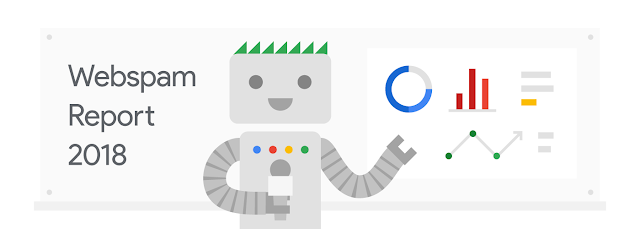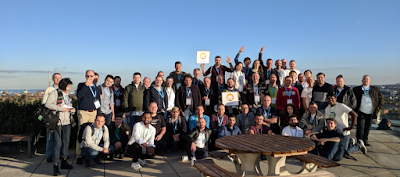Google aims to provide the highest quality results for any search. As part of this, we take action to prevent what we call “webspam” from degrading the search experience, content and behaviors that violate our webmaster guidelines. Our efforts help ensure that well under 1 percent of results visited by users are for spammy pages. Here’s more about how we fought webspam in 2018.
Google webspam trends and how we fought webspam in 2018
Of the types of spam we fought in 2018, three continue to stand out:
Spam on hacked websites: We reported in 2017 that we had seen a substantial reduction of spam from hacked websites in search results. This trend continued in 2018, with faster discovery of hacked web pages before they affect search results or put someone in harm’s way. While we reduced how spam on hacked sites affects search, hacked websites remain a major security problem affecting the safety of the web. Even though we can’t prevent a website hack from happening, we’re committed to helping webmasters whose websites have been compromised by offering resources to help them recover from a hacked website.
User-generated spam: A particular type of spam known as User-generated spam has been a continued focus for us. User-generated spam includes spammy posts on forums, as well as spammy accounts on free blogs and platforms, none of which are meant to be consumed by human beings, and all of which disrupt conversations while adding no value to users. In 2018, we were able to reduce the impact on search users from this type of spam by more than 80%. While we can’t prevent websites from being exploited, we do want to make it easier for website owners to learn how to protect themselves, which is why we provide resources on how to prevent abuse of your site’s public areas.
Link spam: We continued to protect the value of authoritative and relevant links as an important ranking signal for Search. We continued to deal swiftly with egregious link spam, and made a number of bad linking practices less effective for manipulating ranking. Above all, we continued to engage with webmasters and SEOs to chip away at the many myths that have emerged over the years relating to linking practices. We continued to remind website owners that if you simply stay away from building links mainly as an attempt to rank better and focus on creating great content, you should not have to worry about any of the myths or realities. We think that one of the best ways of fighting spam of all types is by encouraging website owners to just create great quality content. Resources such as the SEO starter-guide highlight best practices and bust some common myths and misconceptions related to what it takes to appear well in Google Search results. Reporting link spam is also a great way to assist us in fighting against this type of abuse and to help preserve fairness in Search ranking.
Working with users, webmasters and developers for a better web
Everyday users continue to help us find spam, malware and other issues in Search that escape our filters and processes by reporting spam on search, reporting phishing or reporting malware. We received over 180,000 search spam user reports and we were able to take action on 64% of the reports we processed. These reports truly make a difference and we’d like to thank all of you who submitted them.
We think it’s important to let website owners known when we detect something wrong with their website. In 2018, we generated over 186 million messages to website owners calling out potential improvements, issues and problems that could affect their site’s appearance on Search results. We can only deliver these notifications to site owners that verified their sites in Search Console, and we successfully delivered 96 million of those messages. The rest of the messages will be kept linked with the website for as long as they are relevant, so they can be seen when a webmaster successfully registers their site in Search Console. The majority of these messages were welcoming new users to Search Console, and the second largest group was informing registered Search Console users when Mobile-First Indexing became available. Of all messages, slightly over 2%—about 4 million—were related to manual actions resulting from violations of our Webmaster Guidelines.
High quality content keeps spam off of search results, and we continued to improve the tools and reports we offer for webmasters that create that content. The Google Search Console was completely rebuilt from the ground up to provide both new and improved reports (Performance, Index Coverage, Links, Mobile Usability report), as well as brand new features (URL Inspection Tool and Site and User management). This improved Search Console graduated out of beta in 2018 and is now available generally to all registered website owners.
We didn’t forget the front-end developers who make the modern web work, and focused on helping them make their sites great for users and also search-friendly regardless of whether they are on a CMS, roll their own CSS and JS, or build on top of a web framework. With the new SEO audit capability in Lighthouse, the open-source and automated auditing tool for improving the quality of web pages, developers and webmasters can now run actionable SEO health-checks on their pages and quickly identify areas for improvement.
We also engage directly with website owners to provide help with thorny issues. Our dedicated team members meet with webmasters around the world regularly, both online and in-person. We delivered more than 190 online office hours, online events and offline events in more than 76 cities, to audiences totaling over 170,000 including SEOs, developers and online marketers. We hosted four search events in Tokyo, Singapore, Zurich and Osaka as well as an 11-city Search Conference in India. In 2018, we started live office hours in Spanish on top of English, French, German, Hindi and Japanese, where Webmasters can find help, tips and useful discussion on our Google Webmaster YouTube channel. Product experts continued to help webmasters find solutions through our official support forums in over a dozen languages.
We look forward to continuing our work to deliver a spam-free Search experience to all in 2019!
Posted by Juan Felipe Rincón, Webmaster Outreach, Dublin


